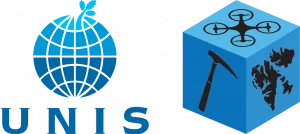Welcome to Geo-MOD#
Teaching geoscientific photogrammetry-based data acquisition and processing#
The first iteration of the Geo-MOD course has run at The University Centre in Svalbard between the 19-24 of June 2023.
This course is designed for students, as well as scientific and technical staff who are interested in learning or enhancing their skills in using UAV-based geoscientific data acquisition for photogrammetry in the field to produce scientifically deliverable and publishable 3D and DEM models.
UAV photogrammetry consists of three main stages:
Data acquisition
Data processing
Data analysis
Geo-MOD is complemented by different modules to cover each stage of the UAV photogrammetry workflow. Geo-UAV, is a tutorial for UAV-based data acquisition in the field, Geo-SfM is a tutorial for acquisition, processing and analysis of structure-from-motion photogrammetry data in the geosciences and AG-222 Compendium is a tutorial that provides different resources for analyzing the data and publish your research.
About Geo-MOD#
Geo-MOD is an open-source reference work for the UAV-based data acquisition in the field.
The reference work is primarily developed as a class-room aid. Best practices and tutorials are based on the experience acquired as part of the Svalbox project, which aims to digitize as many outcrops as possible in Svalbard (Norwegian Arctic).
Schedule#
DAY |
DATE |
TIME |
CONTENT |
ROOM |
|---|---|---|---|---|
Day 1 |
19.06.2023 |
09.00 - 16.00 |
Intro to Photogrammetry |
|
Day 2 |
20.06.2023 |
09.00 - 16.00 |
Data acquisition and processing // UAV Theory and regulations |
|
Day 3 |
21.06.2023 |
09.00 - 16.00 |
Theory field data acquisition // Field data acquisition |
Signehamna // Field |
Day 4 |
22.06.2023 |
09.00 - 16.00 |
Field data acquisition |
Field |
Day 5 |
23.06.2023 |
09.00 - 16.00 |
Data process, analysis and publishing |
|
Day 6 |
24.06.2023 |
09.00 - 12.00 |
Questionnaire, certification, Q&A |
Course content and learning goals#
Geo-MOD course is split in several modules, consisting of interactive lectures walkthroughs, and exercises.
Introduction to Structure-from-Motion Photogrammetry
Geo-referencing
UAV flight regulations
Design your own flight plan
How to fly an UAV
UAV data acquisition
Q&A
Course participants are encouraged to use Issues on GitHub to raise questions regarding content issues so that everyone else with a similar doubt can look into it.
Alternatively, feel free to make notes and annotations through the included Hypothes.is integration.
Project status#
Geo-MOD is still in development, with additional tutorials and how-tos added continously to keep the work up-to-date with recent developments and evolving best practices.
Contribute or improve the resource#
Notice some unclear sections? A typo in the text? Want to add a cool tutorial or how-to on processing? Get in touch and let’s make thing happen!

Fig. 1 This page uses Github as a backbone. All it takes is a Github account, which even comes with student benefits. Once connected, feel free to open an issue as per the above - whether suggesting improvements or highlighting bugs.#
Funding and Support#
The developement of Geo-MOD is funded by iEarth, a Norwegian Center of Excellence for Integrated Earth Science Education.
The Geo-MOD course implements technical knowhow acquired through The Svalbox Project.
UNIS supports Geo-MOD by providing necessary technical and logistical assistance.
NFiP financially supports Geo-MOD development and provided travel stipends for course participants.
Acknowledgements and licensing#
Geo-MOD is implemented through Jupyter Book and the Executable Book Project. This work is licensed under a Creative Commons Attribution-NonCommercial 4.0 International License.





